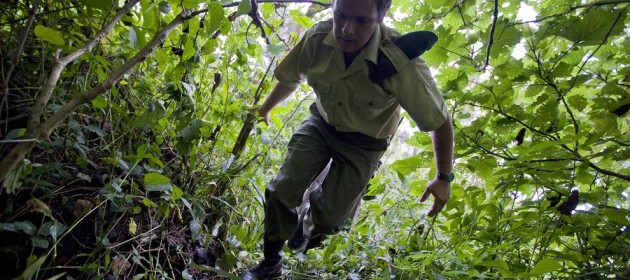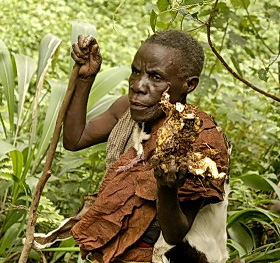

National Geographic Report ~ Warden Emmanuel de Merode, Wounded in Africa’s Oldest National Park Had Enemies
Emmanuel de Merode, chief warden of Virunga National Park, hikes in the Bukima sector of the park on November 24, 2008
By Jack Kahorha in Goma, DRC ~ One day after the top ranger at Africa’s oldest national park was shot in a roadside ambush, details of the attack and the possible motives behind it are emerging.
Emmanuel de Merode, 43, chief warden of Virunga National Park and a member of the Belgian royal family, was shot in the stomach and legs as he drove in a remote area outside the park, which is located along the eastern border of the Democratic Republic of the Congo (DRC). He is in stable condition in a Goma hospital, awaiting transfer to Kenya for further treatment. (Related: “Chief Warden Shot in Africa’s Oldest Park.”)
“[He] will be evacuated from Goma within 72 hours,” said Tuver Wundi, a local environmental activist, after visiting the wounded park warden on Thursday. A de Merode family member said that the bullets broke ribs and perforated a lung but missed other vital organs. “He needs stabilization before he is taken abroad,” Wundi said.

Longtime Activist
De Merode grew up in eastern Africa and trained as an anthropologist. “I came to Congo as a young researcher in 1993,” he told National Geographic in 2008. “Since then, I have dedicated my efforts to working with those involved in rebuilding Congo’s national parks.”
He began working in Virunga, Africa’s oldest national park, which was founded in 1925 and covers an area of forest and savanna roughly the size of Israel. It is one of the world’s most biologically diverse parks, holding 50 percent of the African continent’s species.
De Merode arrived in 2001, at the height of the second Congolese civil war. Four years later, with his father-in-law Richard Leakey, he co-founded WildlifeDirect, a conservation group that supports wildlife rangers in remote and dangerous areas.
In 2008, the Congolese government asked him to take over leadership of Virunga’s ranger corps. It was a particularly dire moment. The previous warden had been arrested for trafficking in charcoal and was also charged with plotting the killing of several of the park’s rare mountain gorillas.
De Merode and his men were tasked with the near impossible duty of protecting the gorillas against further attacks, even as the rebel group known as the National Congress of the Defense of People (CNDP), led by the warlord Laurent Nkunda, controlled much of the park.
De Merode decided that although sporadic fighting between CNDP and the Congolese government forces continued, he needed to move his headquarters from the relative safety of Goma to Rumangabo to closely monitor the situation in the park.
His first major success came in convincing the rebels and other armed groups to leave the gorillas alone, which earned him a reputation as a gifted negotiator attuned to the complex interests of the numerous parties living in and around the vast park.
Eventually, his men were able to retake control of the park. “The incredible dedication of Virunga’s rangers at a time when they were getting virtually no support,” de Merode said in describing that time, “shaped the future of my working life.”
Risking His Life for Wildlife
His life nearly ended around 5:00 p.m. on Tuesday as he drove alone in his Land Rover in Rwaza, an isolated section of bush about 18 miles (30 kilometers) north of Goma, on his way to Rumangabo station, a military base not far from the Virunga National Park headquarters.
Unknown assailants ambushed his vehicle, firing five bullets and hitting de Merode three times on his right side. A passing motorcyclist picked him up and took him to Congolese National Army soldiers stationed nearby, who then transported him to Heal Africa hospital in Goma around 6:00 p.m.
The incident marks the latest in long string of attacks on Virunga rangers. Since 2004, a total of 150 of the park’s 680 rangers have been killed in the line of duty, including one last January.
It was no accident that de Merode was traveling alone. He was acutely aware of the threats he and his fellow rangers faced and did not want to endanger his staff any more than they already were. “In practice, living in Congo is a question of understanding where the threats come from,” de Merode said, “seeing it coming before it hits you.”
He may not have seen this one coming. “It was a well-planned attempt,” said a Goma resident who asked not to be identified. “There are two FARDC [Congolese National Army] positions near the place de Merode was shot,” the activist said. “After he was shot, he managed to get out of his car and lie down while the vehicle continued moving. A motorcyclist who crossed after the incident took him while seriously bleeding to the next FARDC position.”

Long List of Enemies
Although de Merode has been widely praised for his efforts to secure the park and improve the living conditions and economic opportunities for people living around the park, some in Virunga have been unhappy with his rigorous efforts to stop poaching, enforce the ban on charcoal production, and push forward other conservation initiatives. The list of those who might have wanted de Merode killed is lengthy.
On Wednesday Julien Paluku Kahongya, governor of North Kivu Province where Virunga is located, denounced the attack and noted, “Enemies of North Kivu wanted to discourage the project of the 12 Megawatt under construction in Rutshuru.”
The 12 Megawatt project is a hydropower plant under construction on the Rutshuru River. Funded by the European Union, the Howard Buffett Foundation, and other donors, the plant is expected to provide renewable energy to the communities surrounding Virunga.
In addition to green electricity, the Buffett Foundation expects the plant to generate some $10 million a year in revenues, which will be used to fund the park’s protection for the next 75 years, and to spur the creation of as many as 10,000 jobs for locals.
Environmental groups hail the project as a green alternative to exploiting the park’s recently discovered oil reserves. And yet—over the objections of many local communities, the British government, and the UNESCO World Heritage Committee—the London-based oil company Soco International PLC has obtained permission from the Congolese government to conduct seismic testing in Virunga, including in Lake Edward, which some 50,000 people rely on for drinking water and fishing.
De Merode has publicly opposed all oil exploration in the park. The BBC has reported that several diplomatic sources said de Merode had met with a state prosecutor in Goma before he was shot, apparently to deliver sensitive information about oil exploration at Virunga.
National Geographic asked the prosecutor’s office to describe the complaint de Merode is said to have filed against the oil company, but at press time representatives from the office had not responded.
Meanwhile, in New York a new documentary titled Virunga premiered at the Tribeca Film Festival on Thursday night. It depicts the many issues facing the park and the difficult plight of its rangers. The Associated Press reported that the film includes a scene, purported to have been shot by hidden camera, that shows local Soco supporters attempting to bribe park workers to circumvent de Merode and saying, “He’s the one hindering the process.”

Soco has issued a statement condemning the attack and acknowledging “the deep respect held for Mr. De Merode internationally and within the DRC.” It went on to say: “Soco does not condone violence of any kind and makes it clear that any suggestion linking Soco to this crime is completely unfounded, defamatory and highly inappropriate.”
De Merode may have had disagreements with others as well. A staff member at a nongovernmental organization in nearby Nyiragongo who asked to remain anonymous told National Geographic two days before the attack he encountered a man who complained about de Merode.
“This man said de Merode took away his motorbike because it was carrying charcoal. He said he bought it, but he was accused of having got it from the national park. He said he will not make any effort to get it, but he is sure that God will punish [de Merode] on his behalf,” the NGO staffer said.
Illegal charcoal production in the park remains a highly destructive practice that, along with illegal logging, causes massive deforestation. Yet it is also a highly lucrative business, which de Merode once estimated is worth $35 million, largely because it remains the cooking fuel of choice for most inhabitants of the area.
At one time or another, all of the armed groups, including members of the Congolese army, have been involved in the charcoal trade, and de Merode has worked tirelessly to curb its practice inside Virunga.
Besides illicit charcoal, employment in the park was another hot button issue in which de Merode was embroiled.
Each year, he recruits new Virunga staffers, who are required to have graduated from secondary school and to pass a standardized test administered by park authorities. After the test was administered last month, some applicants from Nyiragongo, a community close to the place de Merode was attacked, called into Radio Pole FM to accuse him of bias.
“We passed the test, but no one of our territory was selected,” said one young man. “This does not mean that all of us are not clever enough to pass. De Merode simply hates Nyiragongo young people.”
Meanwhile, Governor Kahongya was skeptical the attackers would be caught. “It will be difficult to get the perpetrators since they came out of the bush, fired their weapons, and then retreated,” he said. “What is important is that de Merode is alive and his life is out of danger.”
Jack Kahorha is a journalist based in Goma, Democratic Republic of the Congo.
FB Comments
Share This Article
Leave a Reply
© 2009. All Rights Reserved. Galiwango Film, Created, Written, Directed and Animated by Solomon W. Jagwe | www.sowl.com



















